(备考词汇专攻)2015届中考英语小复习 151-160(10份10组专题)
- 格式:doc
- 大小:97.50 KB
- 文档页数:4

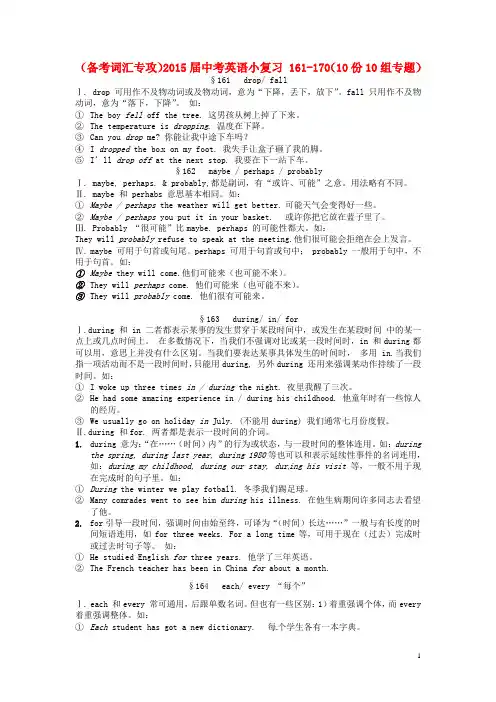
(备考词汇专攻)2015届中考英语小复习 161-170(10份10组专题)§161 drop/ fallⅠ. drop 可用作不及物动词或及物动词,意为“下降,丢下,放下”。
fall 只用作不及物动词,意为“落下,下降”。
如:①The boy fell off the tree. 这男孩从树上掉了下来。
②The temperature is dropping. 温度在下降。
③Can you drop me? 你能让我中途下车吗?④I dropped the bo x on my foot. 我失手让盒子砸了我的脚。
⑤I’ll drop off at the next stop. 我要在下一站下车。
§162 maybe / perhaps / probablyⅠ. maybe, perhaps. & probably,都是副词,有“或许、可能”之意。
用法略有不同。
Ⅱ. maybe 和 perhabs 意思基本相同。
如:①Maybe / perhaps the weather will get better. 可能天气会变得好一些。
②Maybe / perhaps you put it in your basket. 或许你把它放在蓝子里了。
Ⅲ. Probably “很可能”比maybe. perhaps 的可能性都大。
如:They will probably refuse to speak at the meeting.他们很可能会拒绝在会上发言。
Ⅳ. maybe 可用于句首或句尾。
perhaps 可用于句首或句中; probably 一般用于句中,不用于句首。
如:①Maybe they will come.他们可能来(也可能不来)。
②They will perhaps come. 他们可能来(也可能不来)。
③They will probably come. 他们很有可能来。
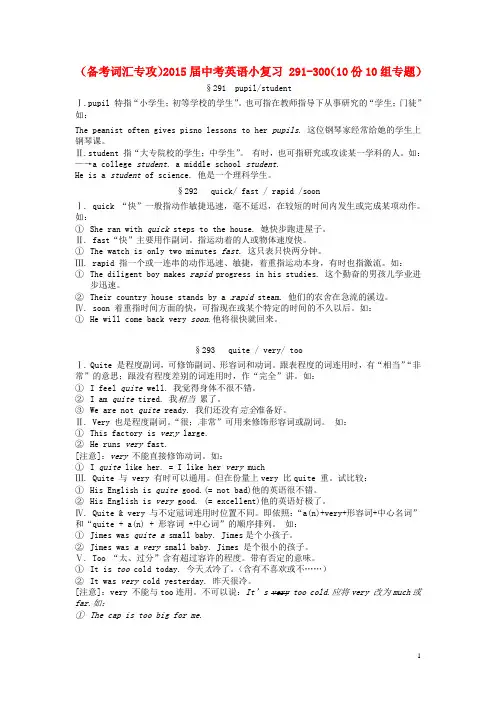
(备考词汇专攻)2015届中考英语小复习 291-300(10份10组专题)§291 pupil/studentⅠ.pupil 特指“小学生;初等学校的学生”。
也可指在教师指导下从事研究的“学生;门徒”如:The peanist often gives pisno lessons to her pupils.这位钢琴家经常给她的学生上钢琴课。
Ⅱ.student 指“大专院校的学生;中学生”。
有时,也可指研究或攻读某一学科的人。
如:—→a college student. a middle school student.He is a student of science. 他是一个理科学生。
§292 quick/ fast / rapid /soonⅠ. quick “快”一般指动作敏捷迅速,毫不延迟,在较短的时间内发生或完成某项动作。
如:①She ran with quick steps to the house. 她快步跑进屋子。
Ⅱ. fast“快”主要用作副词。
指运动着的人或物体速度快。
①The watch is only two minutes fast. 这只表只快两分钟。
Ⅲ. rapid 指一个或一连串的动作迅速、敏捷,着重指运动本身,有时也指激流。
如:①The diligent boy makes rapid progress in his studies. 这个勤奋的男孩儿学业进步迅速。
②Their country house stands by a rapid steam. 他们的农舍在急流的溪边。
Ⅳ. soon 着重指时间方面的快,可指现在或某个特定的时间的不久以后。
如:①He will come back very soon.他将很快就回来。
§293 quite / very/ tooⅠ. Quite 是程度副词,可修饰副词、形容词和动词。
跟表程度的词连用时,有“相当”“非常”的意思;跟没有程度差别的词连用时,作“完全”讲。
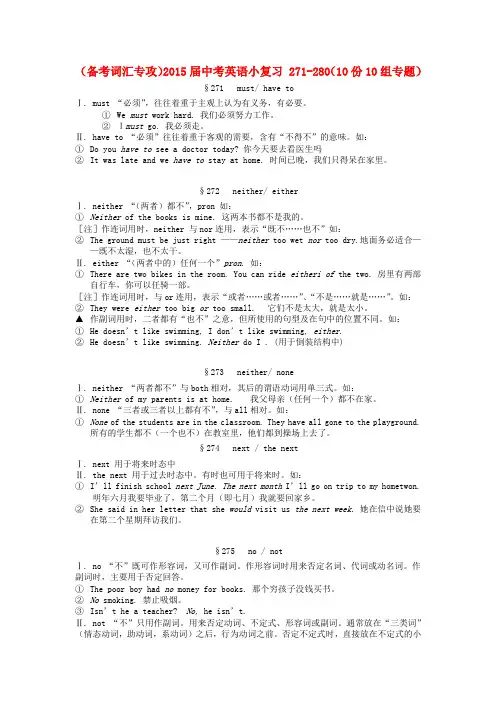
(备考词汇专攻)2015届中考英语小复习 271-280(10份10组专题)§271 must/ have toⅠ. must “必须”,往往着重于主观上认为有义务,有必要。
①We must work hard. 我们必须努力工作。
②Imust go. 我必须走。
Ⅱ. have to “必须”往往着重于客观的需要,含有“不得不”的意味。
如:①Do you have to see a doctor today? 你今天要去看医生吗②It was late and we have to stay at home. 时间已晚,我们只得呆在家里。
§272 neither/ eitherⅠ. neither “(两者)都不”,pron 如:①Neither of the books is mine. 这两本书都不是我的。
[注]作连词用时,neither 与nor连用,表示“既不……也不”如:②The ground must be just right ——neither too wet nor too dry.地面务必适合——既不太湿,也不太干。
Ⅱ. either “(两者中的)任何一个”pron. 如:①There are two bikes in the room. You can ride eitheri of the two. 房里有两部自行车,你可以任骑一部。
[注]作连词用时,与or连用,表示“或者……或者……”、“不是……就是……”。
如:②They were either too big or too small. 它们不是太大,就是太小。
▲作副词用时,二者都有“也不”之意,但所使用的句型及在句中的位置不同。
如:①He doesn’t like swimming, I don’t like swimming, either.②He doesn’t like swimming. Neither do I . (用于倒装结构中)§273 neither/ noneⅠ. neither “两者都不”与both相对,其后的谓语动词用单三式。

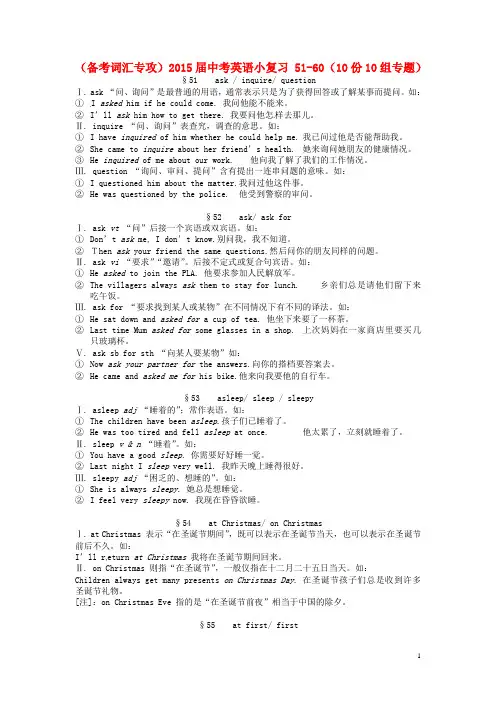
(备考词汇专攻)2015届中考英语小复习 51-60(10份10组专题)§51 ask / inquire/ questionⅠ. ask “问、询问”是最普通的用语,通常表示只是为了获得回答或了解某事而提问。
如:①I asked him if he could come. 我问他能不能来。
②I’ll ask him how to get there. 我要问他怎样去那儿。
Ⅱ. inquire “问、询问”表查究,调查的意思。
如:①I have inquired of him whether he could help me. 我已问过他是否能帮助我。
②She came to inquire about her friend’s health. 她来询问她朋友的健康情况。
③He inquired of me about our work. 他向我了解了我们的工作情况。
Ⅲ. question “询问、审问、提问”含有提出一连串问题的意味。
如:①I questioned him about the matter.我问过他这件事。
②He was questioned by the police. 他受到警察的审问。
§52 ask/ ask forⅠ. ask vt“问”后接一个宾语或双宾语。
如:①Don’t ask me, I don’t know.别问我,我不知道。
②Then ask your friend the same questions.然后问你的朋友同样的问题。
Ⅱ. ask vi“要求”“邀请”。
后接不定式或复合句宾语。
如:①He asked to join the PLA. 他要求参加人民解放军。
②The villagers always ask them to stay for lunch. 乡亲们总是请他们留下来吃午饭。
Ⅲ. ask for “要求找到某人或某物”在不同情况下有不同的译法。
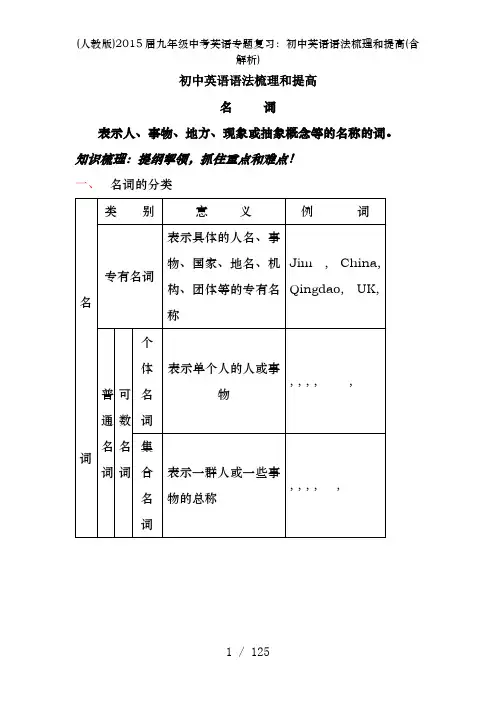
初中英语语法梳理和提高名词表示人、事物、地方、现象或抽象概念等的名称的词。
知识梳理:提纲挈领,抓住重点和难点!一、名词的分类不可数名词物质名词表示无法分为个体的物质, , , , ,抽象名词表示抽象概念的词, , , , ,注:1.专有名词是指人、地方、团体、机构等特有的名称。
第一个字母必须大写。
专有名词前一般不加冠词。
2、有普通名词构成的专有名词前要用定冠词“”,但它不大写。
3、有些不可数名词有时表示为具体的东西时,则变为可数名词,而且以四上也有了变化。
. 一杯啤酒, a 工厂,著作,一个玻璃杯,空间一个房间二、名词的数:表示可以计算数目的人或物称为可数名词。
1、可数名词有单、复数两种形式:可数名词的单数形式要在名词前加“a或”;复数形式是在名词后加“或”。
名词复数形式有规则变化和不规则变化两种,规则变化与其读音可依照下表:当名词为:词尾变化读音例词2. 可数名词复数的不规则变化①改变单数名词中的元音字母 . , —, —, —, —,②单复数同形. , , , ,…③由和构成的合成词, 每个名词都要变复数. a —, a注意: 有些名词表示一种物体具有不可分割的相同的两部分,在使用时只有复数形式. , , , , ;有些名词从形式上看是复数,实际上是单数(其后的谓语动词要用单数). . , , ,3. 不可数名词:表示不能计算数目的人或物,称为不可数名词。
他们前面不能用,没有复数形式。
物质名词和抽象名词都属于不可数名词。
不可数名词一般只有单数形式, 但有其特殊用法:(1)同一个词,变成复数形式, 意义不同。
. 食物各种食物,时间时代,绿色青菜(2)有些不可数名词用复数代指具体的事物. 希望艰苦(3)物质名词在表示数量时,常用某个量词来表示. a , , , …三、名词的所有格名词的所有格是表示名词之间的所有关系,有两种表示形式, 一种是在名词后+’s;另一种是用, 表示“……的”。
1. (1) 一般词的所有格, 直接在词尾+’s。
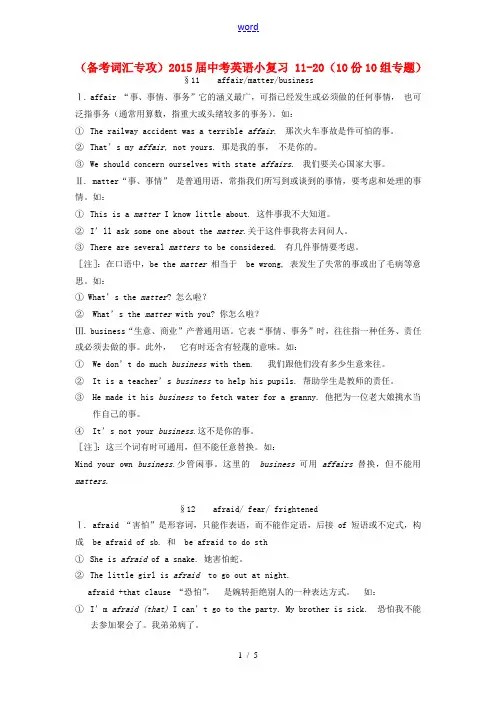
(备考词汇专攻)2015届中考英语小复习 11-20(10份10组专题)§11 affair/matter/businessⅠ. affair “事、事情、事务”它的涵义最广,可指已经发生或必须做的任何事情,也可泛指事务(通常用算数,指重大或头绪较多的事务)。
如:①The railway accident was a terrible affair. 那次火车事故是件可怕的事。
②That’s my affair, not yours. 那是我的事,不是你的。
③We should concern ourselves with state affairs. 我们要关心国家大事。
Ⅱ. matter“事、事情”是普通用语,常指我们所写到或谈到的事情,要考虑和处理的事情。
如:①This is a matter I know little about. 这件事我不大知道。
②I’ll ask some one about the matter.关于这件事我将去问问人。
③There are several matters to be considered. 有几件事情要考虑。
[注]:在口语中,be the matter相当于be wrong, 表发生了失常的事或出了毛病等意思。
如:① What’s the matter? 怎么啦?②What’s the matter with you? 你怎么啦?Ⅲ. business“生意、商业”产普通用语。
它表“事情、事务”时,往往指一种任务、责任或必须去做的事。
此外,它有时还含有轻蔑的意味。
如:①We don’t do much business with them. 我们跟他们没有多少生意来往。
②It is a teacher’s business to help his pupils. 帮助学生是教师的责任。
③He made it his business to fetch water for a granny. 他把为一位老大娘挑水当作自己的事。
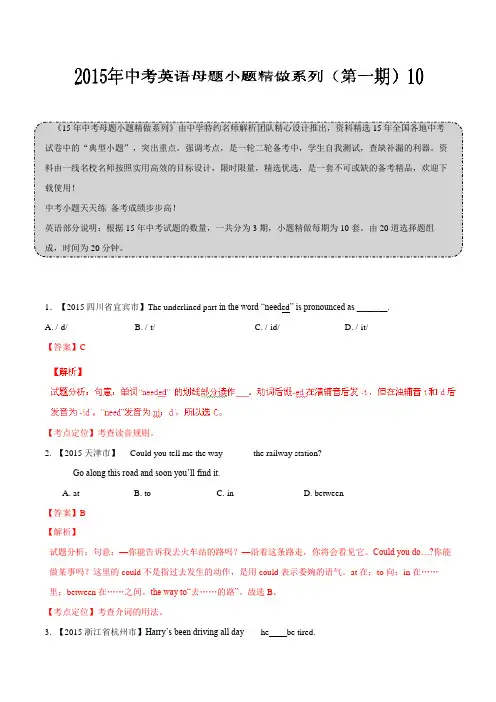
1.【2015四川省宜宾市】The underlined part in the word “need ed” is pronounced as _______.A. /-d/B. /-t/C. /-id/D. /-it/【答案】C【考点定位】考查读音规则。
2.【2015天津市】--- Could you tell me the way ______ the railway station?--- Go along this road and soon you’ll find it.A. atB. toC. inD. between【答案】B【解析】试题分析:句意:—你能告诉我去火车站的路吗?—沿着这条路走,你将会看见它。
Could you do…?你能做某事吗?这里的could不是指过去发生的动作,是用could表示委婉的语气。
at在;to向;in在……里;between在……之间。
the way to“去……的路”。
故选B。
【考点定位】考查介词的用法。
3.【2015浙江省杭州市】Harry’s been driving all day----- he be tired.A. needB. canC. shallD. must【答案】D【解析】试题分析:句意:哈利已经开了一整天车了——他一定累了。
根据句意可知,开了一整天车,所以推测他累是一定的。
所以用情态动词must。
故选D。
【考点定位】考查情态动词4.【2015重庆市】My mother used to make breakfast for _____ every morning, but now I do it myself.A. mineB. myC. ID. me【答案】D【解析】试题分析:句意:过去我妈妈每天早上给我们做早餐,但是现在我自己做。
mine我的,名词性物主代词;my我的,形容词性物主代词;I 我,人称代词主格形式;me我,人称代词宾格形式。
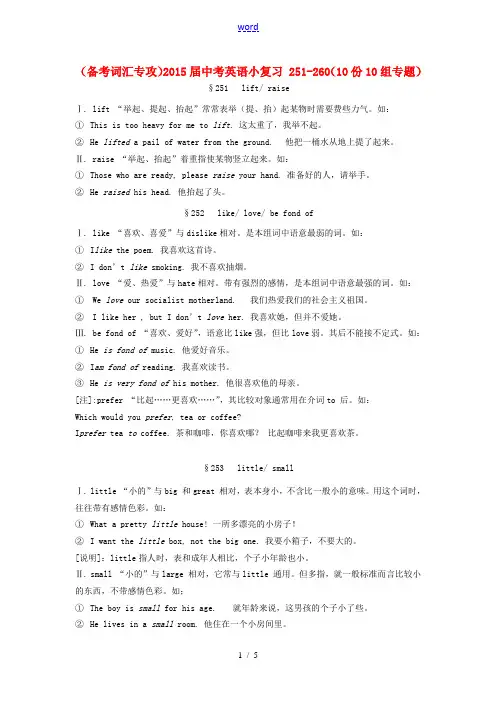
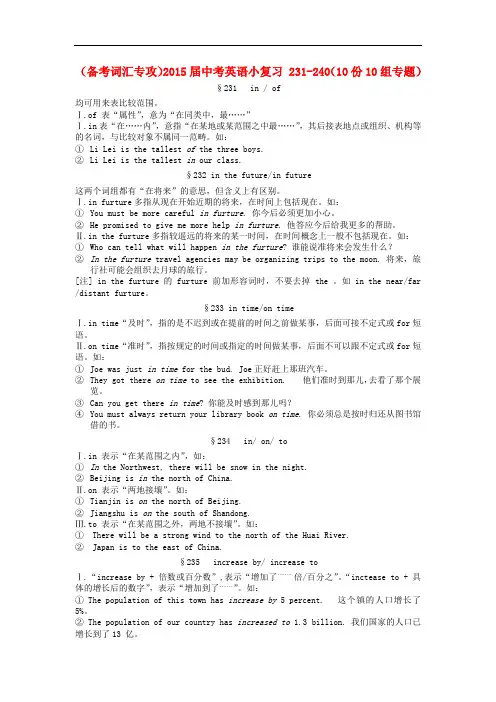
(备考词汇专攻)2015届中考英语小复习 231-240(10份10组专题)§231 in / of均可用来表比较范围。
Ⅰ.of 表“属性”,意为“在同类中,最……”Ⅰ.in表“在……内”,意指“在某地或某范围之中最……”,其后接表地点或组织、机构等的名词,与比较对象不属同一范畴。
如:①Li Lei is the tallest of the three boys.②Li Lei is the tallest in our class.§232 in the future/in future这两个词组都有“在将来”的意思,但含义上有区别。
Ⅰ.in furture多指从现在开始近期的将来,在时间上包括现在。
如:①You must be more careful in furture.你今后必须更加小心。
②He promised to give me more help in furture. 他答应今后给我更多的帮助。
Ⅱ.in the furture多指较遥远的将来的某一时间,在时间概念上一般不包括现在。
如:①Who can tell what will happen in the furture? 谁能说准将来会发生什么?②In the furture travel agencies may be organizing trips to the moon. 将来,旅行社可能会组织去月球的旅行。
[注] in the furture 的 furture 前加形容词时,不要去掉 the 。
如in the near/far /distant furture。
§233 in time/on timeⅠ.in time“及时”,指的是不迟到或在提前的时间之前做某事,后面可接不定式或for短语。
Ⅱ.on time“准时”,指按规定的时间或指定的时间做某事,后面不可以跟不定式或for短语。
2015年中考英语词汇表Aa (an) art. 一(个、件……)ability n. 能力;才能able a. 能够;有能力的about ad. 大约;到处;四处prep. 关于;在各处;四处above prep. 在……上面a. 上面的ad. 在……之上abroad ad. 到(在)国外absence n. 不在,缺席absent a. 缺席,不在accent n. 口音,音调accept vt. 接受accident n. 事故,意外的事ache vi.& n.痛,疼痛achieve vt. 达到,取得across prep. 横过,穿过act n. 法令,条例v. (戏)表演,扮演(角色),演出(戏);行动,做事action n. 行动active a. 积极的,主动的activity n. 活动add vt. 添加,增加address n. 地址advantage n. 优点;好处advertisement n. 广告advice n. 忠告,劝告,建议advise vt. 忠告,劝告,建议afford vt. 负担得起(……的费用);抽得出(时间);提供afraid a. 害怕的;担心after ad. 在后;后来prep.在……之后;在后面conj.在……以后afternoon n. 下午,午后again ad. 再一次;再,又against prep. 对着,反对age n. 年龄;时代ago ad. 以前agree v.同意;应允air n. 空气;大气airline n. 航空公司;航空系统airplane n. (美)飞机airport n. 航空站,飞机场alive a. 活着的,存在的all ad. 全部地 a. 全(部);所有的;总;整pron. 全部;全体人员allow vt. 允许,准许almost ad. 几乎,差不多alone a. 单独的,孤独的along ad. 向前;和……一起;一同prep. 沿着;顺着aloud ad. 大声地already ad. 已经also ad.也although conj. 虽然,尽管always ad. 总是;一直;永远am v.(be 的人称形式之一)America n. 美国;美洲American a. 美国的;美国人的n. 美国人among prep. 在…中间;在(三个以上)之间ancient a.古代的,古老的and conj.和;又;而angry a. 生气的,愤怒的animal n.动物another a.再一;另一;别的;不同的pron.另一个answer n.回答,答复;回信;答案 v. 回答,答复;回信;(作出)答案ant n. 蚂蚁any pron. (无论)哪一个;哪些任何的;(用于疑问句、否定句)一些;什么anybody pron. 任何人,无论谁anyone pron.任何人,无论谁anything pron.什么事(物);任何事(物)anyway ad.不管怎样anywhere ad.任何地方appear vi.出现apple n.苹果April n. 四月area n.面积;地域,地方,区域;范围,领域arm n.手臂,支架army n. 军队around ad.在周围;在附近 prep. 在……周围;大约arrive vi.到达;达到art n.艺术,美术;技艺nas ad.& conj.像……一样;如同;因为prep. 作为,当做Asia n.亚洲Asian a.亚洲的,亚洲人的 n. 亚洲人ask v. 问,询问;请求,要求;邀请asleep a. 睡着的,熟睡at prep.在(几点钟);在(某处)Atlantic a.大西洋的attention n.注意,关心August n.八月aunt n.伯母;舅母;婶;姑;姨Australia n. 澳洲;澳大利亚Australian a.澳洲的,澳大利亚人的n.澳大利亚人autumn n.秋天,秋季avoid v.避免,躲开,逃避awake (awoke, awoken) v.唤醒醒着的away ad.离开;远离Bbaby n.婴儿back ad.回(原处);向后a. 后面的n. 背后,后部;背background n.背景bad (比较级worse, 最高级 worst) a. 坏的;有害的,不利的;严重的bag n. 书包;提包;袋子ball n.球balloon n.气球bamboo n.竹banana n. 香蕉bank1n. (河、海、湖的)岸,堤bank2n.银行baseball n. 棒球basic a. 基本的basket n. 篮子basketball n. 篮球bathroom n. 浴室,盥洗室be v. 是(原形),其人称和时态形式有am, is, are, was, were, being, been;成为beach n.海滨,海滩bear n.熊beat (beat, beaten) v. 敲打;跳动;打赢n.(音乐)节拍a.because conj. 因为become (became, become) v. 变得;成为bed n.床bedroom n.寝室,卧室bee n.. 蜜蜂beef n.牛肉before prep. 在……以前;在……前面ad. 以前conj. 在……之前beg v. 请求,乞求,乞讨begin(began,begun)v. 开始,着手behaviour n. 行为,举止behind prep. (表示位置)在……后面 ad. 在后面;向后believe v.相信,认为bell n.钟,铃;钟(铃)声;钟形物below prep. 在……下面belt n.(皮)带beside prep.在……旁边;靠近besides prep. 除……以外(还有) ad. 还有,此外between prep.在(两者)之间;在……中间beyond prep. (表示位置) 在……的那边bicycle n.自行车big a.大的bike = bicycle n.自行车bill n. 账单;法案,议案;(美)钞票,纸币bird n. 鸟birth n. 出生;诞生birthday n. 生日biscuit n. 饼干bit n.一点,一些,少量的bitter a.有苦味的;痛苦的,难过的;严酷的black n.黑色 a. 黑色的blackboard n.黑板blind a. 瞎的blood n.血,血液blow (blew, blown) v. 吹;刮风;吹气blue n.蓝色 a.蓝色的board n.木板;布告牌;委员会;(政府的)部v.上(船、火车、飞机)boat n.小船,小舟body n. 身体book n. 书;本子boring a. 乏味的,无聊的aborrow v. (向别人)借用;借boss n. 领班;老板both a. 两;双 pron. 两者;双方bottle n. 瓶子bottom n.底部;底bowl n. 碗box n. 盒子,箱子boy n.男孩brain n. 脑(子)brave a.勇敢的bread n. 面包break (broke, broken) v. 打破(断,碎);损坏,撕开breakfast n. 早餐breath n. 气息;呼吸breathe vi. 呼吸bridge n. 桥bright a. 明亮的;聪明的bring (brought, brought) vt. 拿来,带来,取来brother n.兄;弟brown n. 褐色,棕色 a. 褐色的,棕色的brush v.刷;擦 n. 刷子build (built, built) v. 建筑;造building n. 建筑物;房屋;大楼burn (-ed,-ed 或 burnt, burnt) v. 燃,烧,着火;使烧焦;使晒黑bus n.公共汽车bus stop n. 公共汽车站business n. (本分)工作,职业;职责;生意,交易;事业busy a.忙(碌)的but conj.但是,可是butter n. 黄油,奶油butterfly n. 蝴蝶buy(bought,bought) vt.买by prep.靠近,在……旁;在……时间;不迟于;被;用;由;乘(车)bye int.再见Ccabbage n. 卷心菜,洋白菜cake n. 蛋糕,糕点;饼call n. 喊,叫;电话,通话 v. 称呼;呼唤;喊,叫ncamera n. 照相机;摄像机camp n. (夏令)营 vi. 野营;宿营can (could) modal 可能;能够;可以can't = can not v. 不能Canada n. 加拿大cancel vt. 取消cancer n. 癌candle n.蜡烛candy n. 糖果cap n. (无檐的或仅在前面有檐的)帽子;capital n. 首都,省会;大写;资本captain n. (海军)上校;船长,舰长;队长car n. 汽车,小卧车care n. 照料,保护;小心v. 介意……,在乎;关心careful a. 小心的,仔细的,谨慎的careless a. 粗心的,漫不经心的carry vt. 拿,搬,带,提,抬,背,抱,运等cat n. 猫catch(caught,caught)v.接住;捉住;赶上;染上(疾病)cause n. 原因,起因 vt. 促使,引起,使发生CD 光盘(compact disk的缩写)CD ROM 信息储存光盘(compact disk read-only memory的缩写)ceiling n. 天花板,顶棚celebrate v. 庆祝cent n.美分(100 cents = 1 dollar)centre (美 center ) n. 中心,中央century n. 世纪,百年certain a. (未指明真实名称的)某……;确定的,无疑的;一定会…… chair n. 椅子chairman n. 主席,会长;议长chairwoman n. 女主席, 女会长;女议长chalk n. 粉笔chance n. 机会,可能性change v. 改变,变化;更换;兑换cheap a. 便宜的,贱cheat n. & v. 骗取,哄骗;作弊check n.检查;批改vt. 校对,核对;检查;批改cheese n. 奶酪chemistry n. 化学nchest n. 箱子;盒子;胸部chicken n. 鸡;鸡肉child (复children) n. 孩子,儿童China n.中国Chinese a. 中国的;中国人的;中国话的,汉语的n. 中国人;中国话,汉语,中文chocolate n. 巧克力choice n. 选择;抉择choose (chose, chosen) vt. 选择chopsticks n. 筷子Christmas n. 圣诞节(12月25日)church n.教堂;教会cinema n. 电影院;电影circle n. 圆圈 vt. 将……圈起来city n. 市,城市,都市clap vi.拍手;鼓掌class n. (学校里的)班;年级;课classmate n.同班同学classroom n. 教室clean vt.弄干净,擦干净 a. 清洁的,干净的clear a. 清晰的;明亮的;清楚的clever a. 聪明的,伶俐的climb v. 爬,爬行,攀登clock n.钟clone n. 克隆(无性繁殖出来的有机体群)close1a. 亲密的;近,靠近 ad. 近,靠近close2vt.关,关闭clothes n. 衣服;各种衣物cloud n. 云;云状物;阴影cloudy a.多云的,阴天的club n.俱乐部;纸牌中的梅花coach n. 教练;马车;长途车coal n. 煤;煤块coast n. 海岸;海滨coat n. 外套;涂层;表皮;皮毛vt.给……穿外套;涂上coffee n. 咖啡coin n. 硬币Coke n. 可口可乐cold a. 冷的,寒的n. 寒冷;感冒,伤风collect vt.收集,搜集ncolour (美color) n. 颜色vt.给……着色,涂色come (came, come) vi.来,来到comfortable a.舒服的;安逸的;舒服自在的common a.普通的,一般的;共有的communicate v. 交际;传达(感情,信息等)communication n.交际;交往;通讯company n. 公司compare vt. 比较,对照compete vi. 比赛,竞赛competition n. 比赛,竞赛complete a.完成的vt. 完成,结束composition n. 作文;作曲computer n. 电子计算机computer game 电子游戏concert n. 音乐会;演奏会condition n. 条件,状况conference n.(正式的)会议;讨论connect vt. 连接,把……联系起来consider vt. 考虑continue vi. 继续control vt.& n. 控制conversation n. 谈话,交谈cook n.炊事员,厨师 v. 烹调,做饭cooker n. 炊具(锅、炉灶、烤炉等)cool a.凉的,凉爽的;酷copy n. 抄本,副本;一本(份,册……)v.抄写;复印;(计算机用语)拷(备份盘)corner n.角;角落;拐角correct v.改正;纠正a. 正确的,对的;恰当的cost n.价格cost (cost, cost) v. 值(多少钱);花费cotton n. 棉花 a. 棉花的cough n.& vi. 咳嗽could modal v.(can的过去式)可以……;(表示许可或请求)可以……,行count vt.数,点数country n.国家;农村,乡下countryside n. 乡下,农村couple n.夫妇,一对courage n.勇气;胆略course n. 过程;经过;课程ncover n. 盖子;罩 v. 覆盖,遮盖;掩盖cow n. 母牛,奶牛crayon n 蜡笔;蜡笔画crazy a.疯狂的create vt.创造;造成cross n. 十字形的东西vt. 越过;穿过cruel a. 残忍的,残酷的;无情的cry n. 叫喊;哭声 v. 喊叫;哭culture n. 文化cup n. 茶杯cut (cut, cut) v. 切,剪,削,割n . 伤口Ddad = daddy n.(口语)爸爸,爹爹daily a.每日的;日常的ad. 每天n. 日报dance n.& vi.跳舞danger n. 危险dangerous a. 危险的dare v.& aux.(后接不带to的不定式;主要用于疑问,否定或条件句)敢,敢于dark n. 黑暗;暗处;日暮a. 黑暗的;暗淡的;深色的date n. 日期;约会daughter n. 女儿day n.(一)天,(一)日;白天dead a. 死的;无生命的deaf a. 聋的deal v. 对付,应付,处理dear a. 亲爱的;贵的death n.死December n. 十二月decide v. 决定;下决心decision n. 决定;决心deep a. 深ad.深;深厚degree n. 程度;度数;学位delicious a. 美味的,可口的dentist n. 牙科医生depend vi.依靠,依赖,指望;取决于describe vt.描写,叙述desk n. 书桌,写字台develop v.(使)发展;(使)发达;(使)发育;开发vt. 冲洗(照片)ndialogue (美 dialog) n. 对话diary n. 日记;日记簿dictionary n. 词典,字典die v. 死difference n. 不同different a.不同的,有差异的difficult a.难的;艰难的;不易相处的difficulty n.困难,费力dig (dug, dug) v. 挖(洞、沟等);掘dinner n.正餐,宴会direct a.直接的;直达的;直截了当的vt.指挥;指导;管理;指挥(演奏);导演(电影)direction n.方向;方位director n. 所长,处长,主任;董事;导演dirty a.脏的discover vt. 发现discovery n.发现discuss vt.讨论,议论discussion n.讨论,辩论disease n.病,疾病dish n. 盘,碟;盘装菜;盘形物dismiss vt. 让……离开;遣散;解散;解雇disturb vt. 扰乱;打扰divide vt. 分,划分do (did, done) v. & aux.做,干(用以构成疑问句及否定句。
(备考词汇专攻)2015届中考英语小复习 101-110(10份10组专题)§101 broad/ wide都是“宽”的意思。
Ⅰ. broad 指幅面的宽广,侧重表面上的广阔宏大,指人时多形容背、肩、胸等,在较正式或文学性较强的文体中,也可用来描写河流、街道、田野、峡谷等和地形有关的其它东西。
如:The road is 8 metres broad.Ⅱ. wide 指一边到另一边的空间距离,侧重两端之间距离的宽大,指人时多形容眼睛、口等。
如:This skirt is too wide.broad 和wide 的反义词都是narrow.[语法]:度量表示法:“数词+名词(量)+wide(broad)/long长/thick厚/deep深/high 高/tall 身高/around周长”§102 build/ found/ put up/ set upⅠ. build “建筑、建造”指施工建筑,如房屋、桥梁、道路等的建造,也可用于广义。
如:We are building socialism with China’s style. 我们正在建设具有中国特色的社会主义。
Ⅱ. found “创立、成立、创办”批创立一个组织、机构、国家等。
如:①They founded(=built) a school for the blind. 他们创办了一亿盲人学校。
②The People’s Republic of China was founded in 1949. 中华人民共和国成立于是1949年。
Ⅲ. put up 和set up 人含义很多,但他们在表示“搭起、竖起、挂起”以及表建筑物“建起”的意思时,可以通用。
只不过put up 比set up 要常见些。
如:①The boys put up (set up) their tents in the woods. 孩子们在树林里搭起了帐篷。
(备考词汇专攻)2015届中考英语小复习 221-230(10份10组专题)§221 high/ tallⅠ. high “高(的)”,普通用语。
与low 相对。
指块状物体的高度。
主要指本身比一般同类东西较高,或指所处位置较高。
如:①That’s a very high mountain. 那是一座很高的山。
②He looked at the high ceiling. 他望着高高的天花板。
Ⅱ. tall “高的”,常与short相对,也指同类中较高的,尤其是表示高度远远超过宽度或直径。
即指细长物体的高度。
因此可以指人,也可指物。
当指物时,往往可与high 通用。
但不可指山,或大型建筑物。
如:①She is rather tall. 她相当高。
②We can see the tall (high) tower.我们可以看到那个高塔。
§222 hill/ mountainⅠ. hill “小山”通常比mountain 小。
如:①I went down the hill. 我从山上走下来。
②The house stands on the top of a hill.房子在山顶上。
Ⅱ. mountain “高山”,比hill大。
如:①We made our way up the mountain. 我们登山。
②He was brought up in the mountain.他在山里长大的。
§223 help with / help…with.Ⅰ. help with “帮助”后面直接跟名词。
如:①Jones will help with the concert. 琼斯将帮助搞音乐会。
②The children are helping with the housework. 孩子们正在帮助做家务。
Ⅱ. help …with. “帮助某人做某事”即help st with sth. 如:①May I help you with your luggage? 我帮你拿行李好吗?②My father used to help me with my lessons. 父亲过去常常帮助我做功课。
(备考词汇专攻)2015届中考英语小复习 151-160(10份10组专题)§151 die/ dead/ deathⅠ.die 是不及物动词,一般指因生病,负伤等原因而死。
且是非延续性动词(瞬间动词),不能和表示一段时间的状语(for+段时间短语;或since……)连用。
如:①He was born in 1847 and died in 1913. 他生于1847年,死于1913年。
②His grandfather has been dead for two years. = His g randfather died two yearsago. 他爷爷去世两年了。
③He died ten years ago.他是10年前死的。
(不可说:He has died for ten years. 或应说:It is 10 years since he died)Ⅱ.dead 是形容词,表状态,可在句中作表语和定语。
但不可作谓语。
如:①He is dead, but his name sill live for ever in our hearts.他虽然死了但他的名字将永远活在我们心中。
②It doesn’t look like a dead fox.看来不像一只死狐狸。
Ⅲ.death是抽象名词,只能在句中作主语或宾语。
如:①The murderer was sentenced to death. 杀人犯被宣判死刑。
②I heard of his death when I got to his house. 我一到他家就得知他已经去世了。
[注]:①die /dye 此两词本来意义是完全不同的(die “死” dye “染,染上”),只时二者的现在分词形式常易混淆。
die—→dying dye—→dyeing② die for / die from / die of/die away/die down/ die off/ die out1.die for 表“为某一目的、事业等而死”;“渴望、极想”。
1).To die for the people is a glorious death.. 为人民而死,虽死犹荣。
2).I’m dying for a cup of coffee. 我很想喝杯咖啡。
2. die from. 表“死于(创伤、劳累、忧愁等)”。
(除疾病或情感以外的原因)。
如:1).He died from a wound. 他死于创伤。
2).She died from overwork. 她过度操劳而死。
3. die of 表“死于(疾病、情感、饥饿、年老等)”。
1).The old man died of cancer.那老人患癌症死的。
2).His father died of starvation in Germany. 他的父亲饿死在德国。
3). The old woman died of grief soon after her husband’s deth. 那位老太太在失去丈夫后不久就因悲伤而死。
4. die away “消失;停息”如:1).The sound of the car died away in the distance. 汽车的响声在远处消失了。
2).The wind has died away. 风已经停息。
5. die down 指灯火等慢慢地“熄灭”;指骚动等渐渐地“平息下来”如:1).They waited till the storm died down. 他们一直等到风暴停息。
2).The fire died down. 火慢慢地熄灭了。
3).The fighting has died down. 战斗渐渐停止。
6. die off 指一个个相继“死掉”如:1).They had to watch their young children died off through lack of food. 他们不得不眼睁睁地看着孩子们因为没有东西吃而一个个地死掉。
7. die out. “死光;绝种”如:1).These animals have already died out. 这类动物已经绝种。
§152 difficult/ hardⅠ. difficult “困难”多指智力上的困难。
一般可与hard代换。
但比它程度要大。
如:①The question is difficult to answer.Ⅱ. hard “困难”多指体力上的困难。
如:①Some of the apples are hard to reach.§153 litter / rubbishlitter 和 rubbish 都可指“垃圾”,用作不可数名词。
Litter 常指“(室内或公共场所)乱扔的废物(纸屑、不要的包装纸、废瓶等)”还可回收;rubbish 则指“没用的东西(被扔或将要丢弃的无用的东西)”不可回收。
如:①Throw the rubbish out. 把垃圾扔出去。
②The room is full of rubbish. 房间里堆满了垃圾。
③Pick up your litter after a picnic. 野餐后将废弃物收拾好。
§154 discover/ invent/ find / find outⅠ. discover “发现”发现的事物是本来存在的或是有人知道的。
如:①Columbus discovered America. 哥伦布发现了美洲。
②He discovered a box hidden under the floor. 他发现了一只藏在地板下箱子。
Ⅱ. invent “发明”,发明的东西是从前没有的。
如:①Who invented the steam engine?谁发明了蒸汽机?②He has invented a new way of making silk. 他发明了一种造丝的新方法。
Ⅲ. find “找到”指寻找的结果。
是非延续性动词。
如:I am looking for my bike, but I may not find it. 我正在找我的自行车,可是不一定能找到。
Ⅳ. find out “找出、查明”指经过观察、调查把某事、某物查出来,搞清楚,弄明白。
如:When he was a child, he liked to find out how things worked. 他孩提时代时,就爱弄明白各种事物的来龙去脉。
§155 dollar/ poundⅠ. dollar “美元”其货币符号为:$如:①$12.5 = 12.5 dollars 12美元5美分。
Ⅱ. pound “英磅”,英国货币单位。
符号为:£。
如:②£12.5 = 12.5pounds. 12英磅5便士。
[注]人民币为yuan, 符号为:¥。
§156 door/ gateⅠ. door“门”指进出房屋的门或屋内的门,也指车辆或橱柜等的门。
如:①The door opened and a man came out. 门开了,一个人走了出来。
②There are sliding doors between rooms. 房间之间有滑门。
Ⅱ. gate “门、大门”,指出入某一场所的门,如城门以及围墙、围栏、篱笆等的门。
如:①We’ll gather at the school gate at 6:30. 我们六点半在校门口集合。
②Who is the man at the garden gate?谁在花园门口?§157 drag/ draw/ pullⅠ. drag“拖、拉”指慢慢地拖着笨重的东西,意味着所拖的东西阻力很大。
如:①The horse was dragging a heavy load. 马拖着很重的东西。
②The escaped priso ner was dragged out of hiding place. 那逃犯被人从隐藏的地方拖了出来。
Ⅱ. draw “拖、拉”与pull相比,它通常指较平稳地,也往往是比较从容地拉。
如:①Draw your chair up to the table. 把你的椅子拉到桌子旁边来。
② He drew the book towards him. 他把书拉/拖到他面前。
Ⅲ. pull “拖、拉”是普通用语,指用力拉,与push 相对。
如:①Pull the door open. Don’t push it. 把门拉开,别推。
§158 put down/ put up/ put on/ put away /put off /put one’s heart into…Ⅰ. ” “ into heart s one'”“ ”“ off ”“ ” “away ”) (“ ”) (“on ”“ ”敁“ ”“ ” “ up up put ,” )( “down put ⎪⎪⎪⎪⎩⎪⎪⎪⎪⎨⎧ 全神贯注于延期推迟保存收起来戏剧上演衣服穿上建造张贴挂起抬起举起反义词为放下某某把 如:① Don ’t put down your hands. Put them up. 不要放下手,举起来。
② A new notice has been put up . 已经贴出来一张新的通告。
① He took down the old picture and put up the new one. 他把旧画拿了下来,挂上了一幅新画。
② A big building has been put up (= set u p / build)in our school. 我们学校又盖起了一座大楼。
③ He put on his coat and hat and went out. 他穿上大衣,戴上帽子出去了。
④ Has the play been put on at this theater? 这个剧院上演过那部戏剧吗?⑤ Let ’s put our Christmas gifts away and keep them a while. 我们还时把圣诞礼物暂时保存起来吧。
⑥ Put away your coats in summer. 夏天时把大衣收起来。
⑦ The meeting has been put off because of the rain. 大会因大雨而延期举行。
⑧ You can do anything well if you put your heart into it. 如果你全心身地投入,你什么事都能做好。